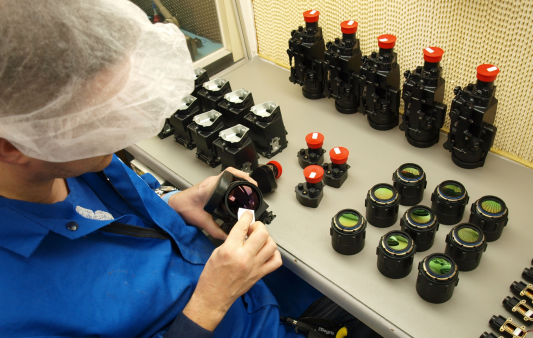Qioptiq – A KTP success story
3 January 2019
Cardiff University expertise helped North Wales company Qioptiq win an £82m defence contract, creating and safeguarding jobs.
Experts from Cardiff Business School spent two years developing a toolset to improve Denbighshire-based Qioptiq’s inventory forecasting operations.
The study was made possible thanks to a Knowledge Transfer Partnership (KTP) co-funded by Welsh Government, the Engineering and Physical Sciences Research Council and Innovate UK.
The collaboration and knowhow led Qioptiq to build a new £3.7m warehouse next to the current Qioptiq plant on the St Asaph Business Park and helped the company secure a six-year deal with the Ministry of Defence (MOD) to service night visions equipment.
The KTP enabled a knowledge transfer Associate in ‘lean’ inventory forecasting business operations, Thanos Goltsos, to work directly with Qioptiq under the supervision of two Cardiff Business School Professors – Aris Syntetos and Mohamed Naim.
Business Wales features a case study on Qioptiq on their website. You can read the case study here.
A better way to forecast
Prior to the KTP, Qioptiq, which supplies photonic devices to the medicine, manufacturing and defence industries, was unable to predict how many items would be ordered and how many returned.
This problem affected its ability to set prices, meet demand, and plan operations.
When Thanos began working with the company, his first priority was understanding how Qioptiq’s operations worked.
Thanos said: “I audited the processes to see how they forecast demand and planned ahead. Qioptiq needed to predict what would be returned in the next few months, as well as seeing the demand patterns of its customers.
I proposed moving to a more agile way of doing things to improve service level and pricing.”
As a result, Qioptiq reduced its inventory by 25%, leading to major cost savings for the firm.
Securing an £82 million contract with the MoD

Thanos’ system not only provided major cost benefits, it also landed the firm its biggest ever contract.
The contract will ensure that UK armed forces around the world have access to essential night vision equipment. It’s predicted that with Qioptiq’s support, the MoD will save £47 million.
Thanos said: “It’s been the biggest contract Qioptiq and the parent company has ever won. They built a new plant worth about £2 million, retained 10 people, and recruited 7 more.”
“The company have been very magnanimous in saying that a big part of them winning the contract was the work we’ve done for them.”
Personal development for Thanos
Through his experience as a KTP associate, Thanos benefited from personal and professional development.
He said: “I had very good supervision from top academics in the field – you have access to the best training, conferences, workshops and academic practitioners.
I also developed a can-do attitude and am now able to tackle diverse problems.”
Find out more about KTPs
The KTP scheme is designed to help UK businesses to innovate and grow through linking business with research or academia.
A graduate is recruited by the academic or research partner. They will work at the company for between 12 and 36 months, looking at a specific strategic innovation project.
Thanos said: “My advice to businesses would be to look at the success of other projects.
“If you have a problem you get subsidised access to world-renowned expertise and academics, you recruit a person suited to the company to sort the problem out, you transfer the knowledge in-house and have the opportunity to retain this person. What’s not to like?”
Find out more about KTPs including how to apply.
The partnership received financial support from the Knowledge Transfer Partnerships (KTP) programme.
KTP aims to help businesses to improve their competitiveness and productivity through the better use of knowledge, technology and skills that reside within the UK knowledge base.
Funded by UK Research and Innovation through Innovate UK, the KTP is part of the government’s Industrial Strategy.